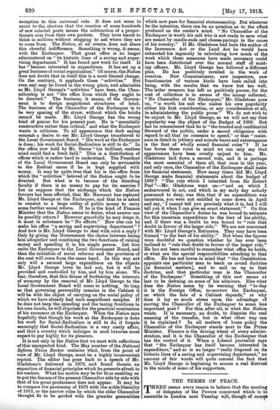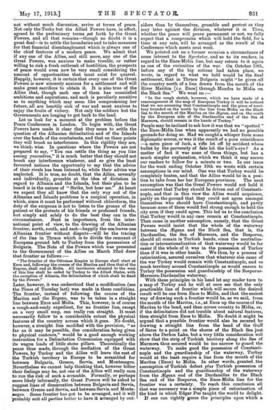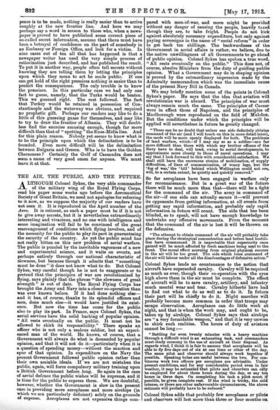THE TERMS OF PEACE.
THERE seems every reason to believe that the meeting of delegates of the Powers concerned which is to assemble in London next Tuesday will, though of course not without much discussion, arrive at terms of peace. Not only the Turks but the Allied Powers have, in effect, agreed to the preliminary terms pet forth by the Great Powers, and all that remains—though no doubt it is a great deal—is to settle the boundaries and to take measures for that financial disentanglement which is always one of the chief features of a modern peace. We admit that if any one of the Allies, and still more, any one of the Great Powers, was anxious to make trouble, or rather willing to risk a fresh outbreak of hostilities, the prospects of peace would even now be very small considering the amount of opportunities that must exist for quarrel.
Happily, however, it is certain that every one of the Great Powers is now sincerely anxious for a settlement and will make great sacrifices to obtain it. It is also true of the Allies that, though each one of them has unsatisfied ambitions and aspirations, and each is peculiarly sensitive as to anything which may seem like compromising her future, all are heartily sick of war and most anxious to enjoy the fruits of victory. Not only the soldiers but the Governments are longing to get back to the land.
Let us look for a moment at the problem before the Peace Conference in London. To begin with, the Great Powers have made it clear that they mean to settle the question of the Albanian delimitation and of the Islands over the heads of the combatants, and that on these points they will brook no interference. In this rigidity they are, we think, wise. In questions where the Powers are not prepared to say, " You can settle the thing as you like among yourselves," it is much better that they should not brook any interference whatever, and so give the least favoured nations the opportunity to say that the advice of their rivals has been listened to, while their advice was neglected. It is true, no doubt, that the Allies, severally and individually, grumble at the idea of dictation in regard to Albania and the Islands, but their plea to be beard is in the nature of " Strike, but hear me." At heart we expect they all know that the only way out of the Albanian and Islands problems is a surgical operation, in which, since it must be performed without chloroform, the duty of the surgeons is not to listen to the groans of the patient or the protests of his friends or professed friends, but simply and solely to do the best they can in the circumstances. Next in importance, from the inter- national point of view, to the drawing of the Albanian frontier, north, south, and east—happily the sea leaves one Albanian frontier without dispute—will be the tracing of the line in Thrace which is to divide the remnant of European ground left to Turkey from the possessions of Bulgaria. The Note of the Powers which was presented to the Government of the Allies on March 22nd drew that frontier as follows :— " The frontier of the Ottoman Empire in Europe shall start at Enos and, following the course of the Maritza and then that of the Ergene, shall end at Midis. All territories situated to the west of this line shall be ceded by Turkey to the Allied States, with the exception of Albania, the delimitation of which shall be fixed by the Powers."
Later, however, it was understood that a modification (see the Times of Tuesday last) was made in these conditions. The frontier, instead of following the course of the Maritza and the Ergene, was to be taken in a straight line between Enos and Midia. This, however, is of course a rough-and-ready expedient, for no frontier line, except on a very small map, can really run straight. It must necessarily follow to a considerable extent the physical features of the country across which it goes. No doubt, however, a straight line modified with the provision, " as far as it may be possible, due consideration being given to physical contours," would be a good enough working instruction for a Delimitation Commission equipped with its wagon loads of little stone pillars. Theoretically the peace thus made, through the mediation of the Great Powers, by Turkey and the Allies will leave the rest of the Turkish territory in Europe to be scrambled for between Bulgaria, Greece, Servia, and Montenegro. Nevertheless we cannot help thinking that, however bitter their feelings may be, not one of the Allies will really care to rim the risk of such a scramble. Formally, or perhaps more likely informally, the Great Powers will be asked to suggest lines of demarcation between Bulgaria and Servia, between Greece and Servia, and between Servia and Monte- negro. Some frontier has got to be arranged, and it will probably suit all parties better to have it arranged by out- siders than by themselves, grumble and protest as they may later against the division, whatever it is. Thus, whether the peace will prove permanent or not, we fully expect that a compromise which will hold the field, for a time at any rate, will be arranged as the result of the Conference which meets next week.
We pointed out on a former occasion a circumstance of some interest to the Spectator, and so to its readers, in regard to the Enos-Midia line, but may return to it again as one of the curiosities of the war. On October 19th, before any of the big actions had taken place, we wrote, in regard to what we held would be the final settlement, that in Thrace Bulgaria might " be given all the country north of a line drawn from the mouth of the River Maritza [i.e. Enos] through Mandra to Midia on the Black Sea." We went on :— " In the rough sketch, however, which we have made of a rearrangement of the map of European Turkey it will be noticed that wo are assuming that Constantinople and the piece of terri- tory bounded on the north by the line from Midia on the Black Sea to the mouth of the Maritza on the lEgean, and on the south by the European side of the Dardanelles and of the Sea of Marmora, should remain in the hands of Turkey."
People may be inclined to ask how it was that we " spotted " the Enos-Midia line when apparently we had no possible grounds for doing so. Had we caught a whisper from some diplomatic source, or was it the result of a pure coincidence —a mere piece of luck, a rifle let off by accident whose bullet by the perversity of fate hit the bull's-eye ? As a matter of fact it was none of these things, but has a much simpler explanation, which we think it may amuse our readers to follow for a minute or two. In our issue for the week ending October 19th we wrote with certain assumptions in our mind. One was that Turkey would be completely beaten, and that the Allies would be in a posi- tion to take from her her European provinces. The next assumption was that the Great Powers would not hold it convenient that Turkey should be driven out of Constanti- nople, and that in this view the Allies would acquiesce, partly on the ground that they could not agree amongst themselves who should have Constantinople, and partly because none of them would feel strong enough to hold the city even if they could agree. This led us to the conclusion that Turkey would in any case remain at Constantinople. Then came in another assumption, namely, that the Great Powers would insist that the whole of the waterway between the Agean and the Black Sea, that is, the Dardanelles, the Sea of Marmora, and the Bosporus, should all remain in Turkish hands, since the neutraliza- tion or internationalization of that waterway would be far easier if the whole of it was in the possession of Turkey than if it was in other hands. We thus, by a process of ratiocination, assured ourselves that whatever else came of the war Turkey would remain with Constantinople, and so much territory around Constantinople as would ensure tc Turkey the possession and guardianship of the Bosporus- Marmora-Dardanelles waterway.
With these principles in his head let any reader turn to a map of Turkey and he will at once see that the only practicable line of frontier which will secure the desired result will be one from Enos to Midia, and that the easiest way of drawing such a frontier would be, as we said, from the mouth of the Maritza, i.e., at Enos up the course of the Maritza to the bend, and then across country to Midia, or, if the delimitators did not trouble about natural features, then straight from Enos to Midia. No doubt it might be argued that a possible frontier would also be secured by drawing a straight line from the head of the Gulf of Saros to a point on the shores of the Black Sea just above the Derkos Lake, but a very little consideration will show that the strip of Turkish territory along the Sea of Marmora thus secured would be too narrow to guard the waterway. To make good the possession of Constanti- nople and the guardianship of the waterway, Turkey would at the. least require a line from the mouth of the Maritza (Enos) to Midia. In other words, granted the assumption of Turkish defeat plus Turkish possession of Constantinople and the guardianship of the waterway from the 2Egean end of the Dardanelles to the Black Sea end of the Bosporus, the Enos-Midia line for the frontier was a certainty. To reach this conclusion all that was necessary was a simple piece of ratiocination of the kind in which Edgar Poe taught the world to delight.
If one can rightly guess the principles upon which a peace is to be made, nothing is really easier than to arrive roughly at the new frontier line. And here we may perhaps say a word in season to those who, when a news- paper is proved to have published some correct piece of so-called secret information, assume that there must have been a betrayal of confidence on the part of somebody in an Embassy or Foreign Office, and look for a victim. In nine cases out of ten all that has happened is that a newspaper writer has used the very simple process of ratiocination just described, and has published the result. To put it in another way, people often tell secrets without knowing they are telling them by letting the principles upon which they mean to act be made public. If one can get hold of the right premises nothing is easier than to predict the consequences. The only trouble is to know the premises. In this particular case we had only one fact to guess, namely, that the Turks would be beaten. This we guessed right. The rest followed. The fact that Turkey would be retained in possession of Con- stantinople and the waterway was obvious, and required no prophetic gift. Perhaps our readers may like to do a little of this guessing game for themselves, and may like to try to draw the frontier of Albania. They will doubt- less find the exercise amusing enough, though far more difficult than that of " spotting " the Enos-Midia line. And for this plain reason. Nobody yet seems to know what is to be the principle upon which the delimitation is to be founded. Even more difficult will be the delimitation between Bulgaria and Greece. Who is to have the Golden Chersonese ? Certainly the Gulf of Cassandra does not seem a name of very good omen for anyone. We must leave it at that.












































 Previous page
Previous page